Travel
72% of Americans Prefer Hotels and Resorts to Vacation Rentals
Editorial Note: The content of this article is based on the author’s opinions and recommendations alone. It may not have been reviewed, approved or otherwise endorsed by the credit card issuer. This site may be compensated through a credit card issuer partnership.
Terms apply to American Express benefits and offers. Visit americanexpress.com to learn more. Citi is an advertising partner.

When it comes to vacation travel, more than 7 in 10 Americans prefer hotels and resorts over vacation rentals like Airbnbs, according to a ValuePenguin survey of more than 1,000 Americans.
They say the reason mostly has to do with more amenities, safety protocols and on-site resources for those who plan to get some work done while on vacation. Vacation rentals do have appeal for larger travel groups, however.
Key findings
- Americans overwhelmingly prefer hotels and resorts to vacation rentals/timeshares, but transparent pricing isn’t a large factor. Among survey respondents, 72% said they would rather stay in a hotel. The top reasons cited include better amenities (37%), ease of booking (33%), more people available for service (32%) and on-site dining and bars (31%).
- Despite more popularity among hotels and resorts, more guests have had a negative experience at a hotel. While 44% of respondents who’ve stayed at a hotel or resort said they’ve had a negative experience, only 29% of previous vacation rental guests say the same.
- Consumers are willing to spend more for their preferred lodging type, and many don’t bother to compare prices between alternatives. Six in 10 would gladly shell out more cash for the type of lodging they prefer, and 54% of respondents don’t even bother comparing shopping between the two lodging categories.
- Many Americans plan to work remotely while traveling this year, and most think hotels and resorts are better-suited for business travel. Of the 1 in 3 respondents who plan to log in to work while vacationing, nearly 60% will stay at a hotel or resort when doing so.
- Travelers think vacation rentals are best for large gatherings like family reunions or a trip with friends, while preferring hotels for business travel and international trips. Though hotels and resorts took the top spot no matter the trip purpose, vacation rentals were popular options for family reunions and trips with friends (44% and 43%, respectively).
Most travelers prefer hotels and resorts to vacation rentals
Hotels dominate traveler preferences, with 72% of survey respondents choosing them over vacation rentals/timeshares. "It’s not entirely surprising," says Sophia Mendel, travel writer at ValuePenguin. "The concept of these types of vacation rental sites is still relatively new."
Furthermore, with hotels, there’s peace of mind. "You simply make your reservation and you’re instantly and securely booked; all you need to do is show up and check in at the front desk," adds Mendel.
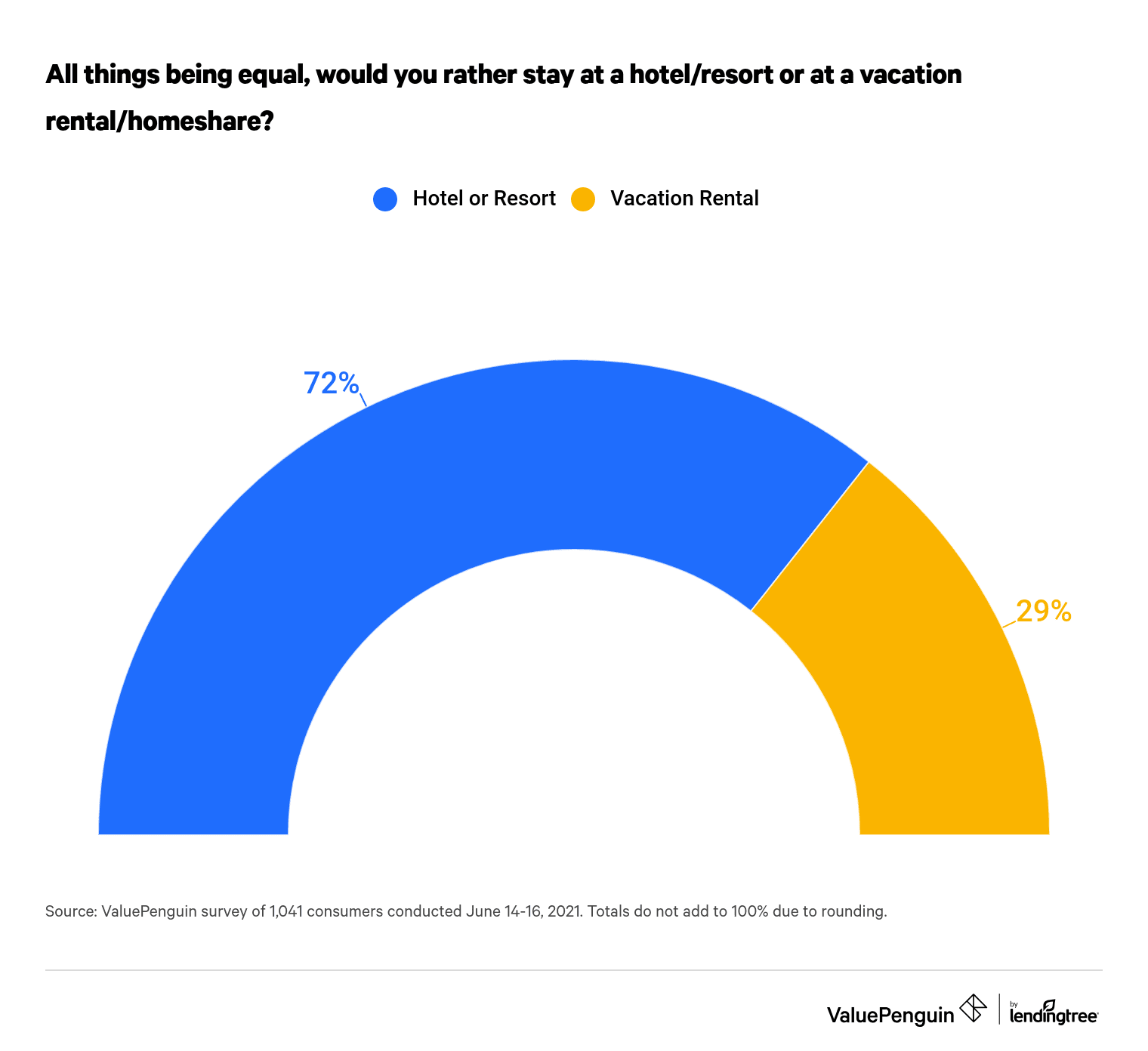
That doesn’t mean that every hotel stay is without issues, however. More people (44%) said they have had a negative experience at hotels or resorts than vacation rentals, as compared with 29% of previous vacation rental guests who said the same.
The popularity of vacation rentals did seem to increase during the pandemic, however. Among those who said their lodging preferences changed due to the pandemic, 20% used to prefer hotels and resorts but now prefer vacation rentals, while 15% said the opposite.
"I think the pandemic helped introduce vacation rentals to more people," says Mendel, as people wanted something more private and isolated from others.
As of now, however, consumers have more faith in hotels and resorts when it comes to staying safe and sanitary versus vacation rental companies (74% versus 26%).
"Marriott, Hilton and the other big hotel chains have all been very public about their cleaning and safety procedures, policies and protocols, and that helps people feel more secure," says Matt Schulz, chief credit analyst at ValuePenguin. "You don’t get that sort of consistency across Airbnb properties, and that might make people a bit nervous."
Travelers like hotels for the amenities and straightforward booking
The top reasons for preferring hotels over vacation rentals have little to do with saving money, and more to do with enjoying comforts and services while away.
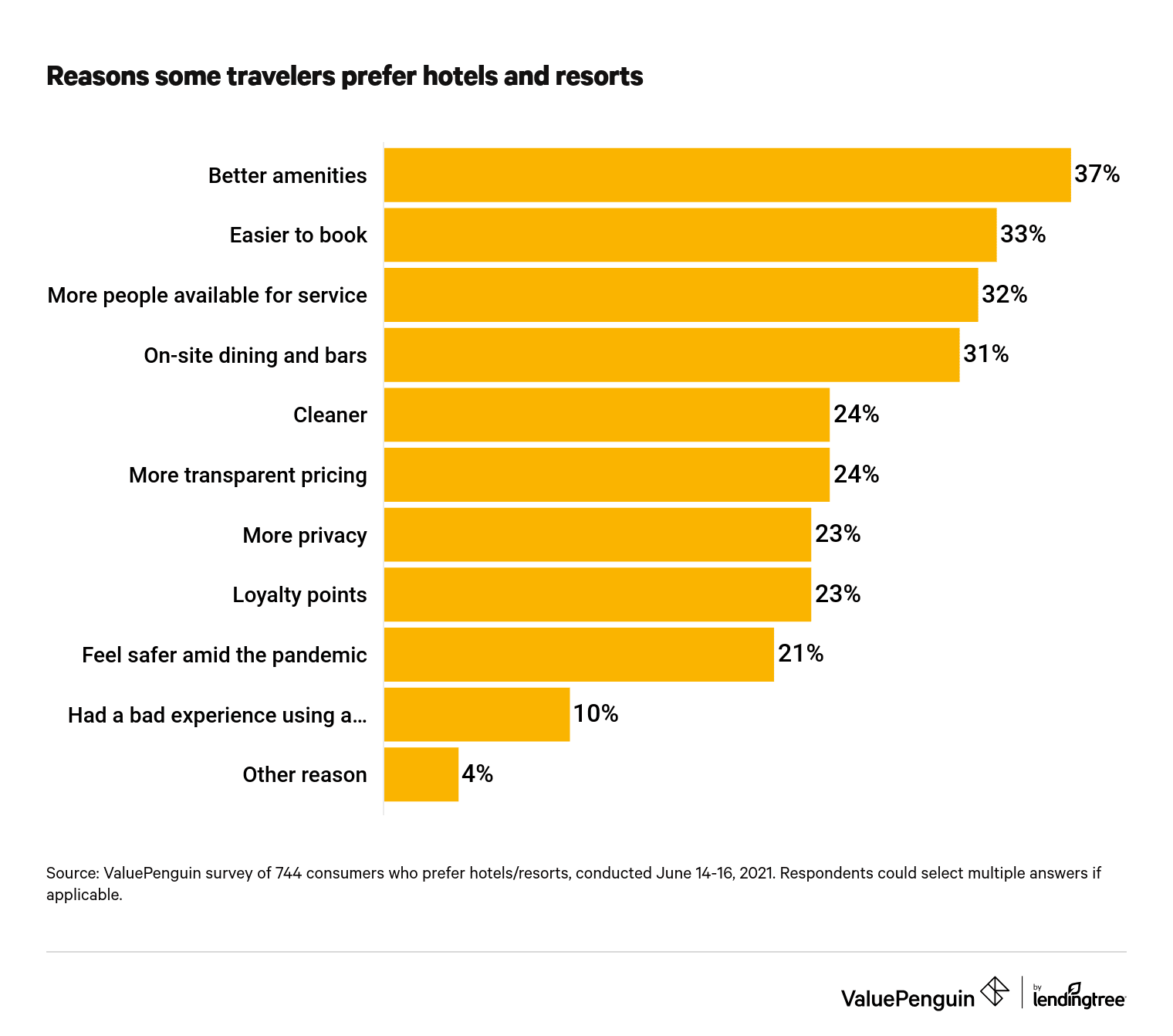
Rentals offer a personalized touch and unique feel favored by some
For those who do prefer vacation rentals, having a more personal feel, access to a full kitchen and staying in more unique locales were the main attractions. Not having to dine out for every meal and being able to entertain large groups within the rental can also save you a huge amount of money on a trip, said Schulz.
He also agrees that the personal feel of a vacation rental can have tremendous allure. "It can make you feel like a local rather than a tourist," he says.
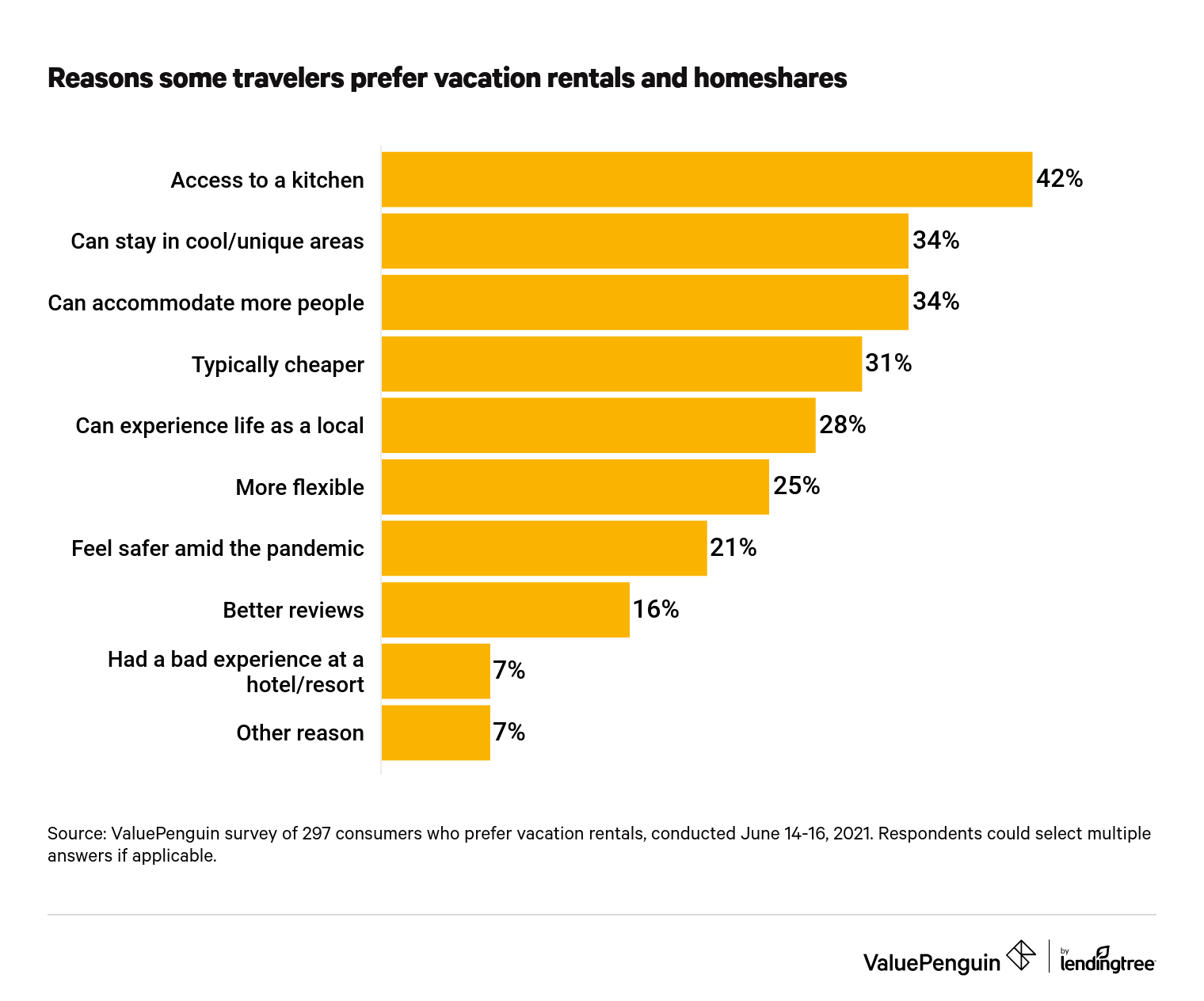
While millennials prefer hotels and resorts, they are the most likely group to prefer vacation rentals: 32% said so, versus 29% of Gen Z and 28% of Gen X.
No matter the generation, however, price wasn’t a top factor for choosing lodging, as many consumers said they were set on their preferred lodging type, no matter the cost. The majority (54%) said they only comparison shop within their preferred category (i.e., checking prices for several Airbnbs, but not comparing those costs to a nearby hotel).
Others are even willing to spend more on their lodging preference: 37% said so for hotels, and 23% for vacation rentals. That still leaves the 4 out of 10 cash-conscious consumers who say they would pick the cheapest option from among hotels and vacation rentals.
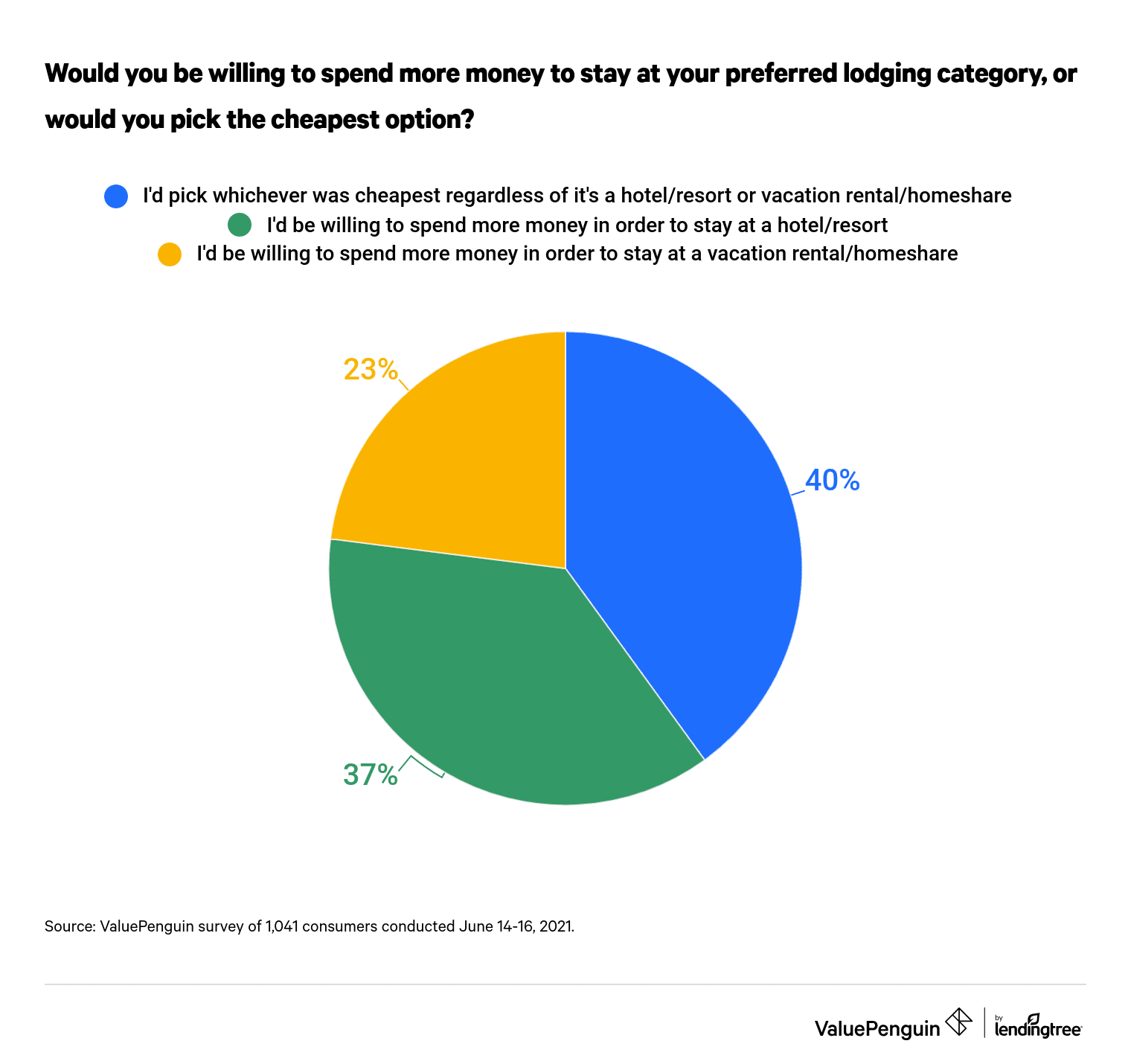
"Shop around is almost always good advice, and travel is certainly no exception to that," says Schulz. But price is just one of the factors that goes into picking the perfect place to stay on a vacation, he adds. "Ultimately, if paying a little bit extra to stay in your ideal place will make for a better vacation, there’s nothing wrong with that. Just don’t put yourself into debt in the process."
Business travelers and remote workers like logging on from hotels, while larger groups opt for more spacious rentals
For the one-third of survey respondents who plan to work while on vacation, hotels seem to be the safer bet: 57% prefer them to the 30% who would rather stay at a vacation rental.
"People may feel that hotels and resorts are more dependable when it comes to having reliable Wi-Fi connection and a quiet place to get their work done – some hotels and resorts even have dedicated business centers," says Mendel.
On the other hand, vacation rentals can be more unpredictable, from spotty Wi-Fi connection to an unsuitable work environment.
Hotels also had a much higher preference among international travelers, and those planning a beach vacation or wellness-focused trip. Trips with friends and family reunions, however, saw a closer split with more than 4 in 10 saying a vacation rental was the way to go.
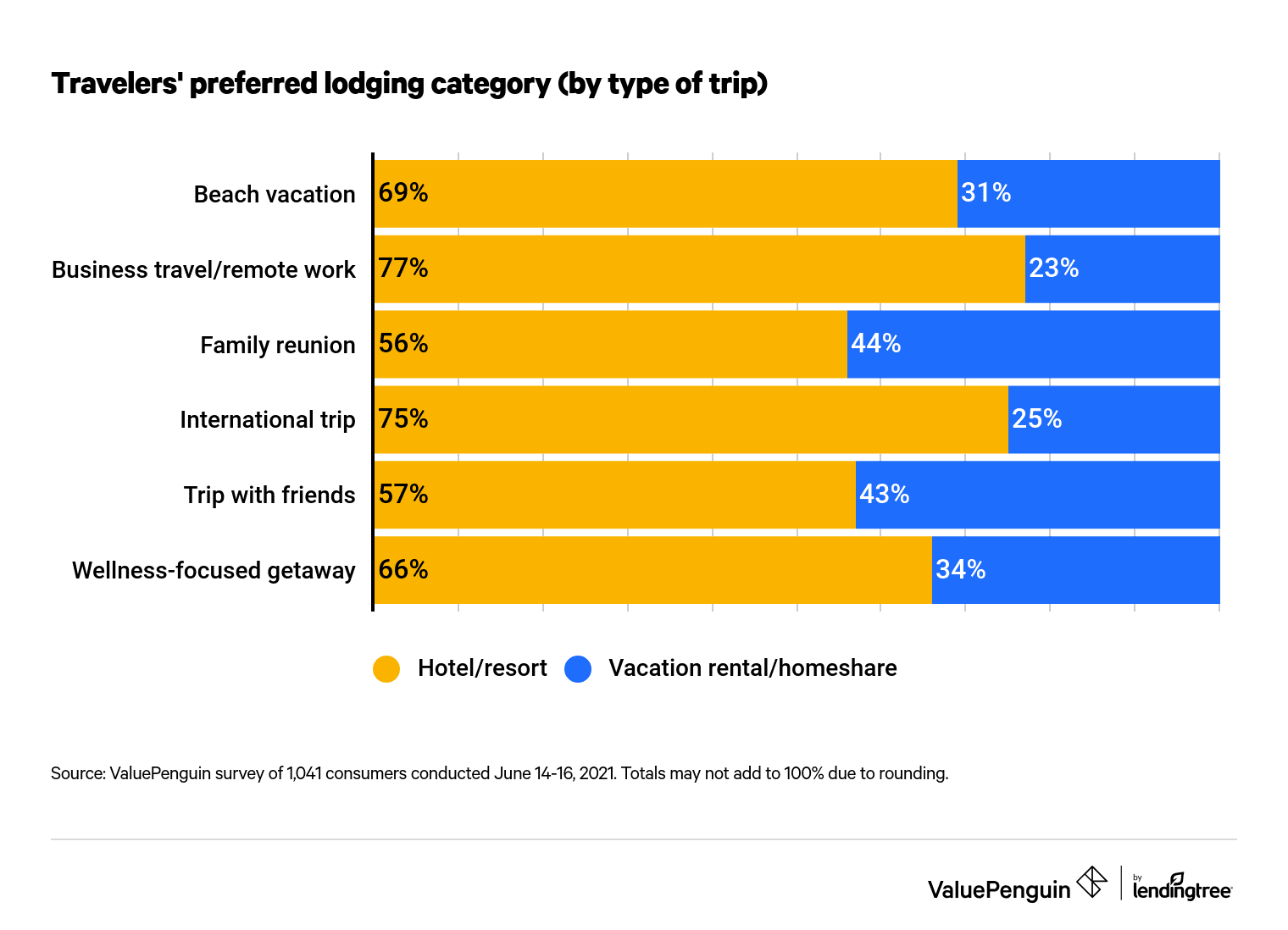
Hotels and resorts vs. vacation rentals: 5 things to keep in mind when making your choice
Hotels and Airbnbs can both offer great services for consumers. Which one is best for you really comes down to many different factors, from price to location and more. Here are some things to think about:
- The type of trip you’re going on, who’s going and where. "Vacation rentals could potentially offer more options," says Mendel. For example, if you’re going on vacation with a group of people, a vacation rental allows you to split the cost of accommodation. And in some locations, you could get more of a true local experience.
- How important service/amenities are to you. If you prefer the convenience of hotel amenities like security, free breakfast, room service and a 24/7 concierge, you may not be as comfortable at a vacation rental that doesn’t offer those types of things, says Mendel. And there’s no front desk to go to if things go wrong. Mendel’s tip: "If you’re planning to stay at an Airbnb, contact your host ahead of time to help things run smoothly when you arrive."
- The travel rewards factor. If you have a hotel credit card or general travel rewards credit card, chances are you can find better deals with a large hotel chain than you could with a vacation rental. "Hotel chains have done a great job of offering perks like free nights, enhanced status and other such perks to credit cardholders and Airbnb simply doesn’t offer anything comparable," says Schulz.
- If you need a backup plan. Vacation rental hosts can sometimes cancel at the last minute, leaving you without alternative lodging; this is something that probably won’t ever happen at a hotel, notes Mendel.
When planning a vacation, it doesn’t hurt to keep an open mind. Don’t limit yourself to just one or the other, says Schulz. "Shopping around can help get you a better deal and ultimately maybe even a better vacation, so you’re doing yourself a disservice if you don’t consider both, at least every once in a while."
Methodology
ValuePenguin commissioned Qualtrics to field an online survey of 1,041 Americans; it was conducted June 14-16, 2021. The survey was administered using a non-probability-based sample, and quotas were used to ensure the sample base represented the overall population. All responses were reviewed by researchers for quality control.
We defined generations as the following ages in 2021:
- Generation Z: 18 to 24
- Millennial: 25 to 40
- Generation X: 41 to 55
- Baby boomer: 56 to 75
While the survey also included consumers from the silent generation (defined as those 76 and older), the sample size was too small to include findings related to that group in the generational breakdowns.
